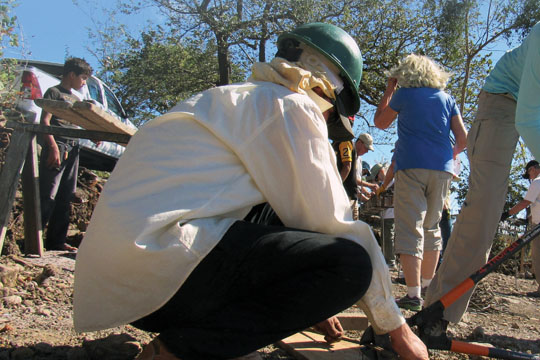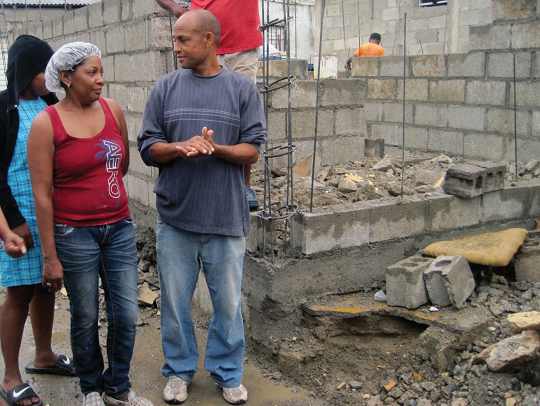
A group of volunteers from Canada and the U.S. work together to build a classroom in Leon, Nicaragua, in February 2020 as part of SchoolBOX’s voluntourism program. Credit: SchoolBOX
Over the phone from her home in New Brunswick, Dorma Grant rattles off a list of holidays she’s been on, many since her retirement in 2009.
“Well, I’ve cycled the Camino de Santiago trail in Spain. I walked the Inca Trail in Peru. I went with my daughter to Venezuela…”
But a beach holiday? No, she huffs. “My holidays tend to be more active and involved than that.”
Active, yes. And involved? Doubly so. Mere recreational vacations aside, Grant has travelled the world — several times over — as one of the growing number of Canadians who build holidays around volunteering their time, money and skills towards improving lives and communities abroad. And when travel bans lift after the COVID-19 crisis subsides, no doubt they’ll be back at it.
Influenced by global sustainability missions by activists such as David Attenborough and Greta Thunberg, voluntourism had become the world’s fastest-growing tourism niche market prior to the pandemic, according to Asia-Pacific Economic Co-operation (APEC). A 2018 report, titled Voluntourism Best Practices: Promoting Inclusive Community-Based Sustainable Tourism Initiatives, estimated there are more than 10 million voluntourists who, in 2016 alone, spent up to $3.6 billion. Within Canada’s borders, a recent online poll by the National Association of Federal Retirees found that 48 per cent of respondents have done voluntourism, 75 per cent of whom found it to be a positive experience.
Yet even among that growing tribe of great do-gooders, Grant, who also volunteers as an advocacy program officer with the National Association of Federal Retirees, is something of a powerhouse. She’s volunteered as a practical nurse along India’s Annapurna Trail in the Himalayas. She’s distributed food to townships around Durban, South Africa. She joined an 800-kilometre fundraising bicycle trip from Richards Bay to Cape Town, spent weeks with the Canadian Baptist Mission in Bolivia and toiled in a tiny village clinic near Bangalore in southern India, established by an Indian doctor she knew from Miramichi, N.B. It all started at age 30 when she took her children, then eight and 12, to Malawi for two years while she volunteered with World University Services as a teacher.
Raised in the service-focused Salvation Army church and propelled along since childhood by an appetite for adventure, Grant was a voluntourist long before the awkward portmanteau was ever uttered, much less defined by Wiktionary. By her estimation, her ratio of voluntourism to actual holidays sits somewhere around 70:30.
“I like adventure. I like people. I was taught that you can’t live selfishly,” she says in her plain-spoken and direct way, no doubt a carry-over from her career as a Corrections Canada parole officer. “It’s very important that we do what we can to improve people’s lives.”
Influenced by global sustainability missions by activists such as David Attenborough and Greta Thunberg, voluntourism had become the world’s fastest-growing tourism niche market prior to the pandemic.
Doing good — and not so good
Improving people’s lives — it’s a proposition that appeals to plenty of Canadians bitten by the urge to share, if not their good fortune, then the skills that created it. And, for the most part, voluntourism is a win-win for everyone involved.
Grassroots organizations such as SchoolBOX, based in Almonte, Ont., not only rely on voluntourists, but have leveraged their muscle and money into building 114 classrooms in Nicaragua. There, the government will supply a teacher if there’s a classroom, but many impoverished communities have no means to build one. Since 2008, SchoolBOX has built the schools and furnished them with books and school supplies, using Nicaraguan workers, architects, electricians and materials. Its efforts are supported by 50 to 100 volunteers annually, who raise $500 each and pay $1,960 for meals, accommodation, transportation, activities and translators. They have to pay for their own flights as well. Once in-country, the volunteers do non-skilled work, such as carrying rebar or spending time reading to students and advocating education to their parents.
“A lot of people want to help, want to do something other than sitting on a beach and having a passive holiday,” explains Jonathan Tam, SchoolBOX’s executive director. “We’ve had people from age seven to 87, entire families, church groups. We’re seeing more people who want to do something meaningful that has an impact.”
Yet there is a significant argument against voluntourism, or at least against those organizations and projects that are either for-profit or not well thought out. Amongst the criticisms — and there are many — some are obvious, some are surprising.
Communities receiving voluntourists often want to be excellent hosts and so they use their own limited resources to feed and accommodate their visitors, who are blithely unaware that despite their goodwill, they’re just another mouth to feed. Also, eager voluntourists who’ve never chopped wood back home cheerfully grab a hammer and help construct buildings that do not meet engineering requirements set out for hurricanes or earthquakes. In some cases, such efforts supplant local workers who would have otherwise been paid and done a better job.
Perhaps the most distressing criticism has been levelled at voluntourists who pay to help at orphanages in developing countries. According to reports by World Vision, some Haitian orphanages are populated by children who are not orphans at all. Rather, their parents were encouraged to place their children in the institution, convinced they’d be fed and educated. The institution then lobbies for international funding and voluntourists to support what is essentially a profitable business. That misrepresentation aside, the Westerners often lavish affection on the children for their brief stay before leaving, cementing the psychological cycle of abandonment.
“Although it seems like a great opportunity, it can have unintended consequences,” notes Ed Walzak, World Vision Canada’s national volunteer manager. “We’re all about creating sustainability in communities, so if you have volunteers coming in to work for free, it disrupts the local economy. Or there are those for-profit programs that create incentives for families to institutionalize their children. Rather than taking children out of a family living in poverty, we have programs designed to help families and communities improve as a whole.”
Walzak doesn’t dismiss all voluntourism out of hand. There are ways that voluntourism can be sustainable, mostly through “experteering,” another combined word to describe those who volunteer special skills or knowledge that might not otherwise be accessible to developing countries.
“A school is not just a building, but an entire system of educators and people who teach the educators,” he explains. “So, if you’re a teacher and there’s a program to help build capacity amongst teachers, that sets the stage for sustainability.”

This Shine the Light Initiative trip took place in January 2013 in Nuevo Renacer in the Dominican Republic. The team built a hurricane-proof home for this couple. During that trip, the group also held a dental and a medical clinic.
Shining the Light
For Vicki Asu, voluntourism is a family passion that’s turned into a personal mission.
Back in 2004, her cousin, Brent Wong, launched the Shine the Light Initiative. A young Winnipeg dentist, he’d just volunteered on a dental mission to Mozambique and Zambia. He returned inspired. Since then, his Shine the Light Initiative has gone into poor communities in the Dominican Republic and, working under the direction of local colleagues, built earthquake-proof housing, ran dental and medical clinics and offered English and health classes.
“For me, these trips are grounding,” says Asu, who lives in Winnipeg and retired in late 2019 from Parks Canada’s Prairie and Northern Region Operations. “I reflect on the arbitrary set of circumstances that led me to having good health, good educational opportunities and meaningful employment. The jarring contrast to the circumstances of the communities where we try to make a difference stays in my consciousness. The volunteer experience fuels my gratitude and motivates my community service.”
The work — “I move rubble from one place to another, lift heavy blocks and mix cement” — means as much to her as to those she helps. She recalls how one family said that having a house with a lock meant every adult could work, instead of someone staying at home as a safeguard against thieves.
“What has all this meant to me? It really challenged me. Took me beyond my comfort zone. Gave context to my career. I took a lot of pride in serving people in my work,” she adds. “Now I can see how the impact of a few individuals can have a huge ripple effect.”
Pro tips from voluntourism’s front lines
Choose your own adventure: A vast number of organizations offer everything from long-term experiences to more immersive holidays, says Casey Bennett from Collette, a renowned tour company that is also an Association preferred partner. “We are putting an emphasis on trying to bring positive impact to the destinations we visit through sustainable partnerships.” Tours involve what Collette calls “Impact Moments,” in which guests visit social enterprises, non-profits or conservation agencies. “We give them immersive experiences while simultaneously supporting organizations that do good work to improve their own community.”
Do your research: “Look at how the organization you’re interested in interacts with the community and how sustainable it is,” suggests Jonathan Tam. “If they have people bring supplies to hand out, that changes the dynamic in the community and makes them dependent. Look for an organization that collaborates to have locals determine their need.” Some reputable resources linking volunteers with opportunities include Moving Worlds, Projects Abroad, Madventurer and Global Volunteers.
Buddy up: Volunteering in a developing country and volunteering in Canada are two vastly different experiences, says voluntourist and recent retiree Vicki Asu. “If it takes you out of your comfort zone, travel with someone who’s done it before.”
Match your skills to the organization: Although voluntourism rallies millennials, many organizations value the deep experience and skills of retirees, says Tam. “You could be lifting rebar, supporting the community, playing soccer with the kids or translating.”

